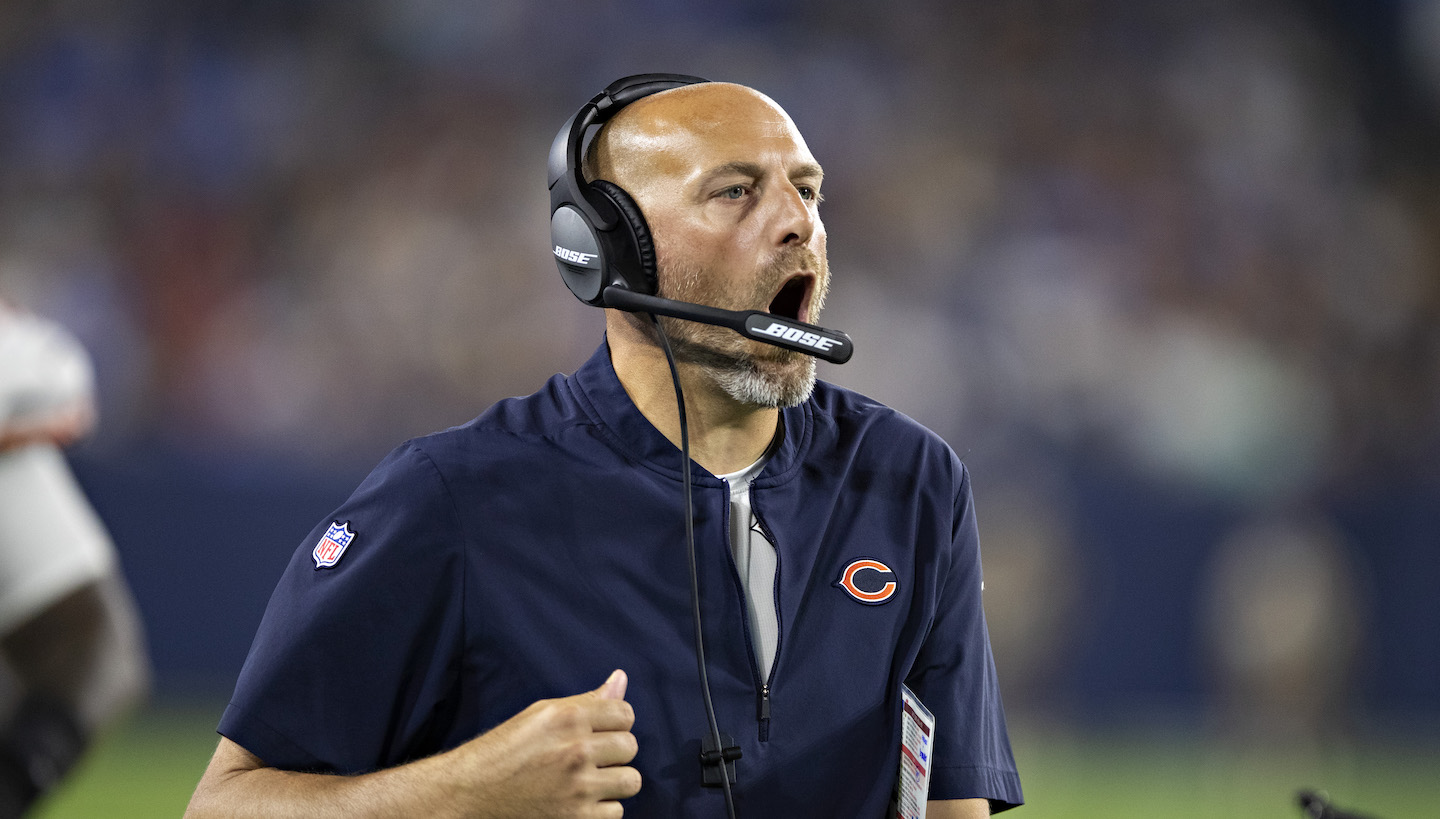Excuse me for a bit of coachspeak, but you’ve got to give Matt Nagy credit for taking it one game at a time. This guy leaves it all out there on the sideline. His compete levels? Through the roof. After a historically bad day for the Chicago Bears' offense that was also the starting debut of a highly anticipated rookie quarterback, he stood up there for 12 minutes and took questions from reporters. “I obviously did not do a good enough job getting this offense ready to go and play a football game,” he said. “It starts with me and ends with me.”
Nagy took the blame for an offense that gained one net passing yard—one!—and 47 total yards on 42 plays, allowing rookie quarterback Justin Fields to be pressured on 60 percent of his dropbacks (the highest percentage in an NFL game ESPN started tracking it in 2009) and sacked nine times. The Browns outgained the Bears 418-47. Stop blinking, that’s a real stat.
Every time I check Twitter, there’s a new number putting into context just how bad the Bears offense was.
The Bears finished with 1 passing yard, the lowest in a game since 2009 in which the Bengals wound up with 0 passing yards in that weird week 17 game against the Jets, who they would play the next week in the playoffs. pic.twitter.com/e4l5Vm4lwX
— Football Perspective (@fbgchase) September 27, 2021
“This is not how we wanted it to go and you almost can’t make it up, it’s that bad,” Nagy said. “We need to get to the film and make sure we are hard on ourselves and understand the whys and go from there.”
The Bears website posted Nagy’s press conference with the headline “Coach Nagy offers candid assessment of loss.” Sure, having the awareness of how bad things went on Sunday is nice and all, but sort of elides the fact that Nagy is the one actually calling the plays and determining the direction of the game. This is his job! He had the power to fix or at least mitigate this while it was actually happening.
Tucked neatly into the end of that candid assessment is Nagy’s favorite solution: the whys. It all sounds very familiar. Just as Nagy’s developed a predictable pattern of never establishing a rhythm on offense, he’s spent his time in Chicago crafting a press conference formula that he runs back as often as he calls a third-down pass short of the line of scrimmage.
- Acknowledge the game was hard and not what you wanted.
- Take blame for the offense’s lack of production. Admit you need to be better, and the team needs to be better.
- Always compliment the defense for playing their asses off and doing all the work.
- Bring it back to the tape. Talk at length about how you can’t answer anything definitively until you and your guys watch the tape back to understand the “whys” behind your mistakes.
- Talk about some throws that Mitchell Trubisky missed.
- Keep it vague and don't provide any specifics regarding actual solutions to the whys. Don’t make any promises you can’t keep.
- Beat a worse team the following week with a slightly improved offensive performance and then credit your guys for caring about the whys and and believing in the whys and understanding how to fix the whys. It’s all good! Nothing to see here. (Note: Chicago plays the Lions next week.)
No. 5 is no longer an option to Nagy, but here’s that pattern at work over the last two offensively terrible seasons:
Jan. 20, 2021
21-9 loss at New Orleans, wild-card round
“Today wasn't good enough.”
"You lost this many heading into the end of it. I think us as a staff we have to look at why is that, where is it and how do we get better.”
Nov. 16 2020
19-13 loss to Minnesota
“Big picture, obviously we struggled mightily on offense and having the four three and outs in the second half. We had field position. We couldn't convert on that in the red zone. So I just, it overshadows how well I thought our defense played and the different sudden changes that they had and how well our special teams played. I was proud of those guys. So two out of the three parts right now are playing well and it's been a constant theme for us.”
Nov. 8, 2020
24-17 loss at Tennessee
“We didn't do enough offensively to get the job done. I thought our defense played really, really well. They're doing everything that we're asking them to do and trying to get that field position going. Special teams played well, and then just recurring theme here on offense. That starts with me, and we've got to get better.”
Oct. 26, 2020
24-10 loss at L.A. Rams
"This is hard. I’ve never been a part of this before. It’s a situation where for all of us very frustrating trying to figure out answers. The hard part is, when you care so much, you’re trying so hard to figure out that identity—and where we’re at, and the why part. That’s the part that stings—just trying to get that thing right. And it hasn’t happened."
Oct. 4, 2020
19-11 loss to Colts
“That was a tough game to be a part of. You start off and you end up punting the ball and you get a [block]—that’s a tough start.”
“Can we play better? Absolutely. Can we coach better? Absolutely. And that’s what we’ve gotta do. We’ve got guys that care and when you care, you figure out answers and I hope that’s what we do.”
Oct. 20, 2019
36-25 loss to New Orleans
The Bears' seven rushing attempts were the fewest ever in a single game in the 100-year history of the team
“It's hard because I give you an answer today and then I watch it tonight and then tomorrow I'll come back, and I'll do that. If I feel like he should have hit one or shouldn't have hit one, I'll tell you. But it's just hard right now. I can't see everything. There's a bunch of why's to it, and that's the hard part.”
“When it's my job to call a play, you do it. You call the right play and you put them in the best situation possible, and until we start recognizing that and understanding that, then nothing is going to change. But something has got to change, and I'll say this, something will change. I don't know what it is, and you guys may not know, maybe you will, maybe you won't, but something will change because it's not good enough right now."
Oct. 6, 2019
24-21 loss to Raiders in London
“You know, in this game, you know, it usually starts up front, and that’s—we know that. We preach it. We talk it. We understand that, and we just throughout the game weren’t real successful offensively with running the football. It’s been an issue this year, and so we need to figure out why.”
Sept. 5, 2019
10-3 loss to Green Bay
“Obviously unacceptable. Starts with me, so this—I just told the guys in there, this is not who we are. I was proud of our defense. I thought they played their ass off tonight. Offensively, not good enough. And we're going to fix it.”
“Whether it was in the run game—I know we ended up throwing a lot more than running, and for whatever reason, we did, that's not what we want. Again, I don't know if I have an answer until I watch the game and I see why. I really don't have an answer.”
When faced with specific problems, like not running the ball against the Saints in 2019, or not involving his tight ends against the Bengals this season, Nagy will acknowledge the issue but not really go out and address it on the field.
“I know we need to run the ball more. I’m not an idiot,” he said in 2019.
“They need to be more involved,” Nagy said of the tight ends after Week 2 this season. “I'm well aware of that. That's my fault for that.”
Another team might fire its play-caller for such blatant failures to adjust his game plan, or even just for yet another iteration of the same admissions of failure, but Nagy’s job is almost certainly safe. The Bears have never fired a head coach during a season. The McCaskeys need some time to figure out the whys, I guess.






